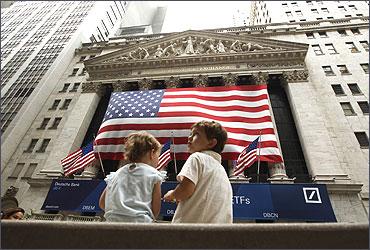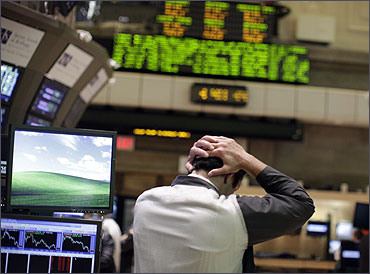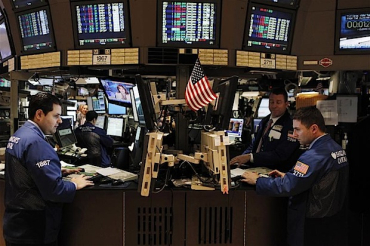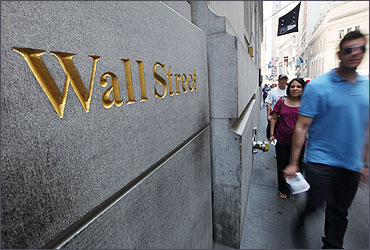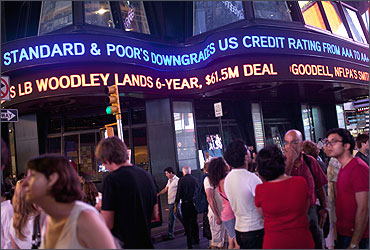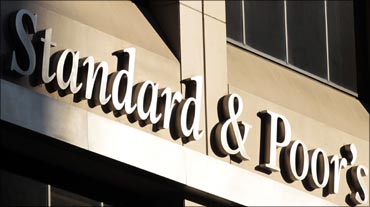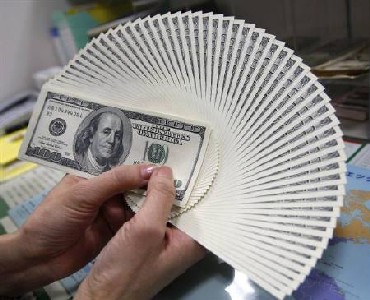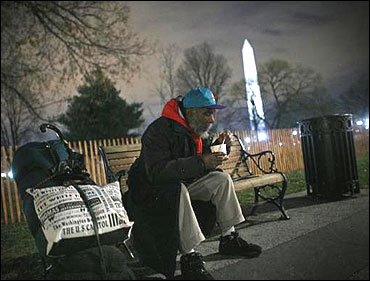 | « Back to article | Print this article |
Why America is the new Japan
"Just what is 'deflation'?" my roommate asked early in the morning while we were having breakfast.
"Deflation?" I asked. "Well, deflation is the opposite of inflation," I explained.
"Great! You are using one jargon to explain another jargon."
"Inflation is a term which refers to phenomenon of rising prices. Deflation is the opposite of inflation and refers to the phenomenon of falling prices."
"Falling prices. Wouldn't that be such a good thing? I could buy some more of my favourite strawberry flavoured diet yogurt. And also the latest line of pink lipsticks which have been just launched."
"Actually, you might just lose your job as well!" I remarked.
"Lose my job? What's the connection here?"
"First tell me where did you come across the term deflation?" I asked.
Click NEXT to read on . . .
Why America is the new Japan
"Actually, I was reading one of these pink papers, and they had used the term in a headline: Is the United States (US) heading towards deflation?" she answered.
"So you did not read the story to understand what the context was?"
"Well, I tried to. But you know how these 'pink-paper' journalists write, trying to show off their knowledge, instead of explaining things in a way that readers like me can understand. I did not understand anything even after reading the story thrice. Though I did catch somewhere that Japan is the only economy which has experienced deflation for a significantly long period of time."
"So let me first explain to you what happened in Japan. Is that okay?"
"Yeah, suits me fine," she said sipping her cup of black coffee rather loudly.
"As you would know Japan was in a bad shape after the end of the Second World War with the US dropping nuclear bombs over Hiroshima and Nagasaki to bring the war to an end."
Click NEXT to read on . . .
Why America is the new Japan
"I ask a simple question and you start telling me the history of Japan since 1945."
"Well, do you want me to keep talking or not?" I asked rather sternly.
"Yeah."
"Gradually the country started to recover and by the early 1970s had become the largest exporter of steel and automobiles in the world. This from being primarily an agriculture-based economy."
"How did that happen?"
"This prosperity continued in the 1980s. Corporate profits were high and the unemployment was low. This also meant that people were earning as well as saving a lot of money," I went on.
"And where did all this money saved go?" she asked.
Click NEXT to read on . . .
Why America is the new Japan
"That's what I was coming to. A major portion of the savings went into the stock market and the real estate market. This led to bubbles in both the markets. As Paul Krugman, the Nobel Prize-winning economist, writes in The Return of Depression Economics and the Crisis of 2008, 'At the beginning of the 1990s the market capitalisation of Japan -- the total value of all the stocks of all the nation's companies -- was larger than that of the United States, which had twice Japan's population and more than twice its gross domestic product. Land, never cheap in crowded Japan, had become incredibly expensive: according to a widely cited factoid, the land underneath the square mile of Tokyo's Imperial Palace was worth more than the entire state of California'," I quoted.
"So that was the Japanese bubble economy."
"Yeah, they called it the baburu keiki. Interestingly the Nikkei, Japan's premier stock market index touched an all-time high of 38,957.44 on December 29,1989, during intra-day trading."
"And then what happened?"
Click NEXT to read on . . .
Why America is the new Japan
"Well, to flush out all the easy money floating around in the financial system the Japanese central bank started raising interest rates, in the hope that people will take out their money from the stock market and the real estate market and park it with banks. Initially this did not have any impact, but a few years down the line, both the markets were down around 60 per cent from the peak levels."
"And what is the status now?" she asked.
"The Nikkei currently quotes at around 8,800, nearly 77 per cent down from peak level, after 22-odd years."
"Good Lord!"
"So the next time some stock market expert tells you that stock markets always make money in the long run, tell them about Japan."
"I sure will!" she exclaimed.
"Now when bubbles burst, they have an impact on the real economy. When the stock market is going up and the real estate prices are going up, people feel wealthy. And they go out there and spend money. The more money they spend, the more money companies earn. Companies then in turn, pay their employees well, and they in turn go out and spend even more money. So this how the cycle of what is called the 'wealth-effect' works."
"And this cycle breaks down when bubbles burst?" she questioned.
Click NEXT to read on . . .
Why America is the new Japan
"Yes, it does. Because suddenly people realise that they are not that wealthy. And when the spending stops, suddenly companies realise that there goods and services aren't selling. So what do they do?"
"Cut prices."
"Exactly. So we have a scenario where prices are falling. But when prices are falling, the expectation is that they will fall further, hence people postpone purchases. When people postpone purchases that means companies don't earn the kind of money they were earning before. This in turn means poor increments, loss of pay or even loss of jobs for employees. And when people around you are losing jobs you are definitely not going to go out and splurge money. Meanwhile, companies keep cutting prices to encourage people to spend, and people keep postponing their purchases. This is deflation."
"And this is what has impacted Japan ever since the bubbles burst."
"On a broad level, yes. Japan has seen periods of deflation as well as close to zero inflation."
Click NEXT to read on . . .
Why America is the new Japan
"And the governments over the years have done nothing to break this cycle?" she asked.
"Oh, yeah, they have. . . interests rates were cut to zero, in the hope that people will go out and borrow money and then spend it. With people spending more money, the government hoped that it would create some inflation, as lots of money would chase the same amount of goods and services. With inflation, prices would rise, and people would then want to buy stuff right away, so that they don't have to pay more in the days to come."
"But it did not turn out that way?"
"Nope. Only if it was so easy to convert theory into practice, then every chemical engineer would be a Dhirubhai Ambani."
"What a statement!"
"Various governments also tried to pump prime the economy. They borrowed/printed a lot of money and decided to spend it in creating infrastructure. This, they hoped, would create jobs and the money earned by people would be spent and thus revive the economy. But that also did not happen. I guess people were just once bitten, twice shy."
"And Japan has been stuck in this quagmire ever since."
"Yes, my dear!"
"But where does the United States come into all this?" she asked.
Click NEXT to read on . . .
Why America is the new Japan
"Oh. The US is going the Japan way."
"The Japan way? What is that?"
"After the dot-com bubble burst towards the turn of the century, the Federal Reserve of the United States, the US central bank, started to cut interest rates. With loans available easily, very soon a real estate bubble built up. This eventually led to what we now know as the sub-prime crisis. In the aftermath of the crisis, interest rates have been brought down to almost zero per cent levels, in the hope that people go out and spend money."
"But that's not happening?"
"Nope. Again the lack of wealth effect is at work. When real estate prices were going up, people felt wealthy, and they spent money either by borrowing or what they earned. Now real estate prices have crashed so people are poorer and they also need to return all the debt they had taken on to speculate when the real estate bubble was on. So despite the US government having low interest rates and printing a lot of money in the hope that people will spend it and revive the economy, that is clearly not happening."
"Like Japan had!" she interrupted.
Click NEXT to read on . . .
Why America is the new Japan
"Yeah. The cycle of wealth effect has broken down. When the cycle of wealth effect breaks down, company profits and revenues get hit, which in turn means firing of employees as well lesser hours for existing employees. The current rate of unemployment in the US is 9 per cent. But unofficial estimates put it at almost double that number. So when your friends are being fired, the last thing you will do is go out and spend money. With low spending, companies again cutting prices in the hope that will make people buy more. But that again is not happening, because people expect prices to fall further and thus postpone purchases."
"So what you are effectively saying is that the US is the new Japan."
"Yes, madam!"
"But what was that bit about losing my job?"
"I thought you would have understood that by now."
"How's that?"
"You work for a BPO company whose major clients are in the US."
"So?"
"So if the companies in the US get hammered, there is likely to be less business for India-based BPOs and that might mean fewer jobs in India."
"In fact, if the American companies decide to cut costs, that might mean more jobs in India," she explained, having the last laugh, as always.
The author can be reached at shonalee.biswas@rediffmail.com
